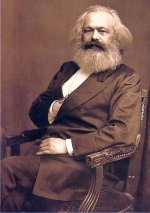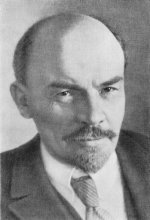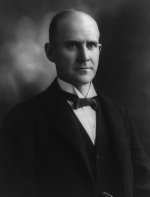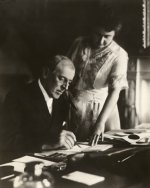
The Legacy of Karl Marx: Or, the Inheritance We Dare Not Squander
A talk presented at a symposium marking the one-hundredth anniversary of Marx's death, Oregon State University. 1983.
As a man of the blue water, I am somewhat frustrated by this assignment to coast along the beach. I have considerable sympathy with John Updike: "Writing criticism is to writing fiction and poetry as hugging the shore is to sailing the open sea." One of the basic weaknesses of contemporary American historians, for example, is that they talk too much about each other and too little about the history.
Hence I would prefer to offer you an example of the Marxist legacy by providing a Marxian analysis and interpretation of a specific moment of history: say American intervention in Vietnam, Central America or the Middle East; or the relationship between poverty in the United States and destitution in the Third World; or the Reagan's Administration's position on the Law of the Sea.
But duty calls, and I will offer you a Marxian analysis of the legacy of Karl Marx. And so into the paradox that Updike misses a Marxist evaluation of Karl Marx is sailing on the open sea.
We are here tonight because Marx simply will not go away. You damn Marx and he winks at you, and then shivvies you with a footnote that sends you to the emergency room of the British Museum. You praise Marx, and he frowns, then says: "But you missed the point." There is no ambulance service for that particular predicament. Paladin heal thyself.
Let us begin by getting straight on Marx's objective. He sought to integrate extensive knowledge of the past and present with a moral imperative in order to provide a goad and a guide for contemporary action to create a more humane and equitable culture. It was and remains a noble and bold inheritance, and we deny it at our peril. Marx was not primarily concerned with reforming and preserving the status quo by ameliorating the condition of the masses. He had the dream of people making their own history as individuals creating a community. We have certainly mislaid - perhaps even forgotten - that vision; and so if there is any point in celebrating Marx it involves recommitting ourselves to the ideal of community, and to the search for ways to move from where we are to such a more humane way of life.
If you are willing to consider accepting that challenge, then consider first Marx's strategy of inquiry. That seemingly abstract proposition is in truth an extremely pragmatic issue. For purposes of contrast, we can compare Marx's approach with the current concern within universities, as well as corporations and even governments, with producing a profitable short-term bottom line. Let us agree to ignore the Freudian implications of that depressingly scatological self-definition by the leaders of American culture. Marx was concerned with long-term structural change. Hence he defined his strategy of inquiry in terms of deciding what questions to ask and what relationships to establish and explore, in order to make sense of the world and how it worked over the long haul.
Here we must do a bit of history. Marx was a creature of Western Capitalism. He matured in a world that was transforming itself from mercantilism into laissez faire - do-your-own-thing - free enterprise capitalism. The ruthless power of the State had created in the name of community the conditions for private license.
Marx quickly understood that history, and as a student of Georg Wilhelm Friedrich Hegel interpreted it as an example of the dialectical process in the real world. The inherent dynamic of one system of political economy produced a different system. That led him to ask the right questions. First: how does free enterprise capitalism work in practice? Second: what is the relationship between economic power and government policy? Third: what is the interrelationship between such economic power and the life of the mind - otherwise known as education and the more general public awareness and perception of reality? Fourth: what questions do and do not get asked within a capitalist society? Fifth: what will be the nature of the next new system?
Full answers to those questions would require two things not present in this room: genius in me, and the patience of Job in you. They nevertheless remain the right questions, and so our tribute to Karl Marx. I suggest that there is nothing more important in 1984 than to function as citizens struggling to answer those questions and so honor the legacy of Karl Marx.
To honor his commitment to the dialectical process, I will offer relatively short commentaries on those questions so that we will have time to engage each other in dialogue.
One. Marx built upon the foundation laid by Adam Smith, Thomas Malthus, and David Ricardo; but he transcended their explanation of the capitalist process. Marx began with the Smithian proposition that capitalism is based on the division of labor, and the constant expansion of the marketplace to acquire human and material resources as well as markets. By denying and then destroying the system of mutual obligations that was at the core of feudalism, capitalism in the name of freedom and liberty fragmented the labor force and thus extracted far more from the workers than they were paid. That exploitation created capital, some of which was reinvested in further production. Thus Smith could argue that capitalism was a perpetual motion machine.
More perceptive than Smith, however, Marx understood that competition eventually destroys competition, and hence creates a modern form of feudalism - consolidated corporate power - without the old traditions and constraints of responsibility. That process results in a fitful but nevertheless steady decline in the consequential role of workers and even small businessmen in shaping the conditions and quality of their lives. Marx was probably too often inclined to define that loss of power in terms of real income, but he clearly understood the social meaning of the impoverishment of life under capitalism. People steadily lost control of their lives because their actionable options were increasingly defined by fewer and fewer people. Smith sensed that danger, and therefore stressed the vital importance of a continuous expansion of the marketplace. Given a sharp and generous eye, one can even find in Smith the rudiments of what today is called the Marxian theory of free-trade imperialism and neo-colonialism. Consider his attitude toward the American Revolution: Smith realized that classic colonialism became counterproductive once the colony had been firmly integrated into the capitalist marketplace dominated by the mother country or metropolis. For at that point formal independence became largely meaningless in determining the political economy of the weaker country.
Marx recognized the strength of that argument. He dealt with it in a paradoxical way by favoring the rapid expansion of the imperial marketplace in order to accelerate the same kind of self-consciousness and militance in the colonies that the corporations would generate in the metropolis. One can argue with that prescription, but it is difficult to deny that his general analysis has produced the best single guide to understanding the revolt of the Third World.
Two. Marx once called the government of capitalist political economies little more than the executive committee of the high bourgeoisie. It is a stinging aphorism, and like all aphorisms encapsulates a subtle and intended knowledge. Actually, Marx was quite aware that determined action by workers and small businessmen could force reforms that were beneficial. But he insisted that those who controlled the means of production would ultimately override those efforts, or control their scope, administration and purpose - or, indeed, even initiate their preferred kinds of reform. And here it is clear that the best modern analyses of capitalist reform movements have been written within a Marxian framework.
Marx also understood better than Smith that the imperative to expand the marketplace, combined with the power of the capitalist definition of reality within the government, would generate a powerful momentum toward war. He was hardly so stupid or ignorant as to think that war was the unique creature of capitalism. Nor was he so naive as to imagine that high capitalists told prime ministers or presidents what to do over a brandy, or by calling them on the telephone.
The point is rather more complicated. As people locked into the assumptions of a capitalist political economy, government leaders have no option but to honor the imperatives of the marketplace. And, beyond that, the productive power of capitalism increasingly dehumanized the nature of war. Killing another human being in the name of an abstraction is always disturbing to the psyche. But it is more honest to kill face-to-face than over the horizon - or even at a distance which denies the other person a face. The dehumanization of war is the ultimate dehumanization of work. Capitalism must be awarded the credit for that achievement.
Three. Marx has often been criticized for oversimplifying the relationship between what he called the economic base and the intellectual superstructure. There is some truth to the charge, but it is largely a case of misplaced concreteness. He was quite aware that ideas influence the relations of production, as witness his comments about various reform movements. But he was primarily concerned with attacking the proposition that ideas had an ethereal and independent origin, and lived a self-contained existence. His weakness is more usefully defined by having never taken the time to prepare a detailed study of the reciprocal relationship between the base and the superstructure.
Even so, Marx was certainly correct in arguing that those who control the means of production define the nature and character of work; and they therefore define much of the direct and indirect character of life including formal and informal education. Surely we all know that the origin of the public school system evolved out of the marketplace need for certain basic skills, and that economic leaders successfully transferred the cost of that training to the citizen taxpayer. Here at OSU we certainly are aware that most modern universities are under great pressure from corporations (and governments) to design their courses to meet the needs of the corporations. With the exception of a very few brave universities, even the schools for the elite teach the Liberal Arts within that framework. After all, there are many more John F. Kennedys and Henry Kissingers than there are Cyrus Vances and Martin Luther Kings.
Marx's analysis is even stronger when we consider the various idioms of mass communications. With a very few notable exceptions, reality is presented as a montage of random information selected and edited by a tiny handful of very powerful people. We get what they think is fit to take seriously. Note that I did not say, did not say, what is fit for us to think. I said what is fit to know and what is fit to take seriously. The point is that if you define what it is possible to know, and within that framework what to take seriously, then you do not have to worry about what is fit to think. That will generally take care of itself.
On balance, and whatever Marx's personal weaknesses, the Marxian legacy has guided and informed the best interpretations of the relationship between the economic base and the intellectual and social superstructure of capitalism. That is underscored, moreover, by the analyses offered in literature, history and other formal academic disciplines.
Four. Two questions take precedence under capitalism: how to turn a short-term profit, and how to keep the system from generating the very opposition that Marx predicted. Those two imperatives have so limited and inhibited the life of the mind, let alone the quality of life, that they amount to a denial of the human spirit. Let us agree that Adam Smith was correct in arguing that entrepreneurial capitalism freed human beings from the constraints of medieval and mercantilist cultures. We must also insist that Marx was correct in explaining how corporate capitalism forged new fetters. One eats to be human; one does not define being human as eating ever more. Or acquiring ever more goodies. Or skewing science toward military purposes.
Five. There is much in Lenin's thought and practice that I disagree with, but he understood at least one essential element of Marx's thought. Marx realized that capitalism increasingly defined human beings by their function in the marketplace - and so demeaned and stunted their lives, turning them inwards upon themselves as possessors of trivia. In looking forward to a different system, Lenin once said that human beings should not only be able to - but they ought to - move from being a carpenter to being a poet to being an engineer to being a ditch digger to being a member of the government - and then back to being a carpenter. There, surely, is an exciting alternative to capitalist culture.
It simply will not do to dismiss that vision because Lenin failed to realize it in practice. It is a dream worth dreaming, and it comes from Karl Marx.
We come now to the time for the dialectical process to unfold. So permit me my summary of Marx's legacy. First, the weaknesses. I have mentioned some of those in passing, so here I will concentrate on the major items.
First, Marx never broke free of the capitalist conception of time defined as short-run success. Or, if you prefer, as a child of capitalism he never transcended that highly distorted sense of time. He sought to force the historical process even as he explained how all good things take time. He wanted to see the good times arrive before he died, and yet his analysis made it clear that it could not happen in his lifetime. I think that compression of time did more to thwart his dream than all of his talk about the dictatorship of the proletariat because it blinded him to his own truth that over time the proletariat would become the majority and would not need a dictatorship.
Second, Marx once got roaring drunk with a moderately incompetent lieutenant in the Prussian Army. The process took a considerable time and, whatever his limits as an army officer, the lieutenant was a committed radical and a shrewd observer. He wrote a friend that Marx had a love-hate relationship with the aristocracy, and "accordingly he has tailored his system to them." Combined with his foreshortened sense of time, that goes a long way to explain why Marx never gave serious thought to alternative visions of socialism or communism. Or, perhaps more accurately, why he slipped into the habit of thinking of communism as better capitalism rather than as something vastly different. And that mistake forever bedevilled the socialist and communist movements that emerged from Marx's thought.
On balance, however, the strengths of Marx outweigh his weaknesses. We can begin with his detailed, tough and persistent inquiry into the dynamics of capitalism that produced a strategy of intellectual inquiry that has provided a sustained tradition of exciting and consequential scholarship in almost every field of knowledge.
Then we must salute Marx's deep commitment to the proposition that, since human beings make their own history, we can devise and create a more human and equitable life as members of a community. We can change the world. That is indeed the ultimate purpose of knowledge - to change the world for the better.
Next we must acknowledge that the people who have acted on those Marxian contributions have indeed improved the lives of millions of non- and even anti-Marxists. We Americans need to think only of Eugene Debs, Theodore Roosevelt and Woodrow Wilson. There is no reason to digress into the issue of how rigorous Debs was as a Marxian theoretician. The point is that he was the American symbol of democratic socialism as an alternative to corporate capitalism.
Roosevelt was always looking over his shoulder at socialism, and Debs gave him a bad case of the shakes. That pushed Roosevelt to advocate and support increasingly consequential reforms. Wilson was in his own way even more upset and ultimately imprisoned Debs for his militant opposition to American entry into an imperial war. Wilson was not the kind of a man who found it easy to admit that he was mistaken, and so he never pardoned or released Debs. But Wilson knew that Marx was the force behind Debs, and on at least one great occasion Wilson spoke directly to the challenge and the influence of Marx.
It happened during the peace negotiations at the end of World War I, and in the narrow sense involved the issue of whether or not to intervene with massive force to overthrow the Bolshevik Revolution in Russia. But his remarks tell you a very great deal about Wilson's support for various reforms. Here is what he said:
"There was certainly a latent force behind Bolshevism which attracted as much sympathy as its more brutal aspects caused general disgust. There was throughout the world a feeling of revolt against the large vested interests which influenced the world both in the economic and in the political sphere. The way to cure this domination [is in my] opinion, constant discussion and a slow process of reform; but the world at large [has] grown impatient of delay.... Bolshevism was therefore vital because of these genuine grievances.... British and American troops were unwilling to fight in Russia because they feared their efforts might lead to the restoration of the old order, which was even more disastrous than the present one.... It was certainly a cruel dilemma...."
Finally, and as Wilson realized, Marx understood power. The dynamics of capitalism would generate power against capitalism. Hence capitalism must either transform itself or it would be changed by a resort to force. In his last public document, a deeply moving essay published in 1924 called "The Road Away from Revolution," Wilson urged Western leaders to transform capitalism into a more humane social order because otherwise capitalism would destroy itself in an attempt to destroy socialism.
I thought of Woodrow Wilson and those remarks near the end of The Day After. And for the first time during the movie I wept. Then I thought about how Marx in The Communist Manifesto praised capitalism more intelligently and generously than all but a handful of capitalists. Next I thought about how capitalism had come increasingly to ask fewer and fewer tough questions about the purposes and consequences of the knowledge and power it had done so much to create. Had come, in truth, to discourage such questions.
Finally I thought again about Woodrow Wilson fighting his way back from a massive stroke to speak his final truth: capitalism must transform itself into a truly democratic and equitable community or it will destroy itself.
And then in the movie I watched, the people who talked about "my property" become victims not of the bomb but of the denial of community. Even the doctor hero calling a pile of rubble my property. Then another human being offered to share a last bit of food, and embraced the dying doctor.
There, I submit to you, is the ultimate legacy of Karl Marx.
Table of Contents
- The Politics of Ecological Balance
- Seven Americas on the Way to the Future: An Exploration of American History
- The Crisis of American Democracy
- The Legacy of Karl Marx: Or, the Inheritance We Dare Not Squander
- The Intellectual in American Public Life
- Commencement Address
- Fred Harvey Harrington: Committed, Tough and Foxy Educator and Liberal.
- The Intellectual Menopause and Changing One's Major
- The Comparative Uses of Power: China on the African Rim and the United States on the Pacific Rim
- Harvey Goldberg and The Virtue of History
- Vietnam and the Revival of An Anti-Imperial Mood and Movement In the United States and the Beginnings of a Thaw in The Cold War.
- America As a Weary and Nostalgic Culture
- The Potential of Higher Education







